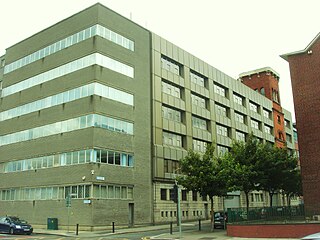Related Research Articles

Genealogy is the study of families, family history, and the tracing of their lineages. Genealogists use oral interviews, historical records, genetic analysis, and other records to obtain information about a family and to demonstrate kinship and pedigrees of its members. The results are often displayed in charts or written as narratives. The field of family history is broader than genealogy, and covers not just lineage but also family and community history and biography.

The National Archives and Records Administration (NARA) is an independent agency of the United States government within the executive branch, charged with the preservation and documentation of government and historical records. It is also tasked with increasing public access to those documents that make up the National Archives. NARA is officially responsible for maintaining and publishing the legally authentic and authoritative copies of acts of Congress, presidential directives, and federal regulations. NARA also transmits votes of the Electoral College to Congress. It also examines Electoral College and constitutional amendment ratification documents for prima facie legal sufficiency and an authenticating signature.

The FamilySearch Library (FSL), formerly the Family History Library, is a genealogical research facility in downtown Salt Lake City. The library is open to the public free of charge and is operated by FamilySearch, the genealogical arm of the Church of Jesus Christ of Latter-day Saints.
The National Digital Newspaper Program is a joint project between the National Endowment for the Humanities and the Library of Congress to create and maintain a publicly available, online digital archive of historically significant newspapers published in the United States between 1836 and 1922. Additionally, the program will make available bibliographic records and holdings information for some 140,000 newspaper titles from the 17th century to the present. Further, it will include scope notes and encyclopedia-style entries discussing the historical significance of specific newspapers. Added content will also include contextually relevant historical information. "One organization within each U.S. state or territory will receive an award to collaborate with relevant state partners in this effort."
FamilySearch is a nonprofit organization and website offering genealogical records, education, and software. It is operated by the Church of Jesus Christ of Latter-day Saints and is part of the church's Family History Department (FHD). The Family History Department was originally established in 1894, as the Genealogical Society of Utah (GSU); it is the largest genealogy organization in the world.
Enterprise content management (ECM) extends the concept of content management by adding a timeline for each content item and, possibly, enforcing processes for its creation, approval, and distribution. Systems using ECM generally provide a secure repository for managed items, analog or digital. They also include one methods for importing content to manage new items, and several presentation methods to make items available for use. Although ECM content may be protected by digital rights management (DRM), it is not required. ECM is distinguished from general content management by its cognizance of the processes and procedures of the enterprise for which it is created.
Ancestry.com LLC is an American genealogy company based in Lehi, Utah. The largest for-profit genealogy company in the world, it operates a network of genealogical, historical records, and related genetic genealogy websites. It is owned by The Blackstone Group, which acquired the company on December 4, 2020, in a deal valued at $4.7 billion.
The Immigrant Ancestors Project, sponsored by the Center for Family History and Genealogy at Brigham Young University, uses emigration registers and other documents to locate information about the birthplaces of immigrants to the United States and other countries. Such information may not be found in the port registers or naturalization documents in the destination countries. Volunteers working with scholars and researchers at Brigham Young University have created a database of millions of immigrants based on these emigration registers. The Immigrant Ancestors Project focuses on emigrants from England, Ireland, Spain, Germany, France, and Italy.

Crowdsourcing involves a large group of dispersed participants contributing or producing goods or services—including ideas, votes, micro-tasks, and finances—for payment or as volunteers. Contemporary crowdsourcing often involves digital platforms to attract and divide work between participants to achieve a cumulative result. Crowdsourcing is not limited to online activity, however, and there are various historical examples of crowdsourcing. The word crowdsourcing is a portmanteau of "crowd" and "outsourcing". In contrast to outsourcing, crowdsourcing usually involves less specific and more public groups of participants.

The National Archives of Ireland is the official repository for the state records of Ireland. Established by the National Archives Act 1986, taking over the functions of the State Paper Office and the Public Record Office of Ireland. In 1991, the National Archives moved to its current premises in Bishop Street, Dublin. The Archives stand on the site of the Jacob's Factory, one of the garrisons held by rebels during the 1916 Easter Rising.
Granite Mountain is a mass of solid rock one mile up Little Cottonwood Canyon in the Wasatch Range of Utah, not too far from Salt Lake City, Utah. Despite its name, Granite Mountain is primarily composed of quartz monzonite, an igneous rock similar to granite in appearance, physical characteristics, and chemical composition. This is the same material used to construct the Salt Lake Temple and the facade of the LDS Conference Center.

FamilySearch Centers (FSC), formerly Family History Centers (FHC), are branches of the FamilySearch Library (FSL) in Salt Lake City, Utah, operated by the Church of Jesus Christ of Latter-day Saints. The centers supply resources for research and study of genealogy and family history. As of 2024, there are more than 6,316 FSC in 149 countries.

The BYU Family History Library (FHL) is located in the Harold B. Lee Library (HBLL) on the campus of Brigham Young University in Provo, Utah. It is one of the Family History Centers devoted to assisting library patrons in genealogical research. It began as a small section of the BYU library in 1962, and later expanded into a branch of the FamilySearch Library, the genealogical library of the Church of Jesus Christ of Latter-day Saints, in 1964. It was formerly known as the Utah Valley Regional Family History Center. The BYU FHL houses a large collection of physical materials, such as microfilms, photographs, books, and other documents. It also offers access to digital materials, including genealogical databases and digitized newspapers. Scanners, computers, and printers are also available. The BYU FHL assists patrons online through its website, YouTube channel, and hosted webinars. It also offers classes in a variety of areas related to genealogy.
MyHeritage is an online genealogy platform with web, mobile, and software products and services, introduced by the Israeli company MyHeritage in 2003. Users of the platform can obtain their family trees, upload and browse through photos, and search through over 19.9 billion historical records, among other features. In early 2021 they were acquired by Francisco Partners for $600 million.

The National Archives of Finland is a Finnish government agency under the Ministry of Education and Culture. It is responsible for archiving official documents of the Finnish state and municipalities. It consists of three locations in the capital Helsinki and seven former regional archives, which were incorporated into the National Archives in 2017 and have since been its branches.
GenealogyBank.com is an online subscription genealogical service that provides access to records useful in family history research. GenealogyBank is one of the largest collections of digitized U.S. newspapers, dating back to 1690. In addition to digital newspaper archives, GenealogyBank also offers other online genealogy resources including the Social Security Death Index, obituaries, government publications, and historical books.
Charles Schroeter was a United States Army soldier who received the Medal of Honor for his actions during the American Indian Wars, while serving with Company G, 8th Regiment of the United States Cavalry. A German immigrant, his military career spanned thirty-one years, from 1863 to 1894, during which he also saw action in the American Civil War. He also served a tour of duty in the United States Marine Corps. After retirement from the military, he became a merchant.

Reclaim The Records is a non-profit organization and activist group that advocates for greater transparency and accessibility for genealogical, archival, and vital records in the United States. They use state Freedom of Information requests and lawsuits to force government agencies, archives, and libraries to provide copies of previously inaccessible records to the public. Reclaim The Records then digitizes and publishes the records online for free public use, without any copyrights or usage restrictions.

Arkiv Digital AD AB is a Swedish company that produces and provides color photographs of historical records, along with digital indexes of names for historical research. These resources cover a time span from the 1600s to the 1900s. The company’s primary clientele includes genealogists, historians, local history researchers, libraries and associations.
References
- ↑ "66,511 volunteers set FamilySearch indexing record". Deseret News. July 26, 2014. Archived from the original on July 26, 2014.
- ↑ "Inmates Serve in FamilySearch Indexing Program". Mormon Newsroom . 2015-01-15. Retrieved 2017-06-11.
- ↑ "FamilySearch 1940 Census Index Grows to 37 States". Family Tree Magazine. August 9, 2012. Archived from the original on August 11, 2018. Retrieved August 10, 2018.
- ↑ "Find an Indexing Project". FamilySearch . July 20, 2018.
- ↑ "Advocates kick-off Freedmen's Bureau digital indexing project". Clayton News Daily. June 18, 2015.
- ↑ "FamilySearch Completes Digitization of Massive Microfilm Collection". FamilySearch. September 21, 2021.